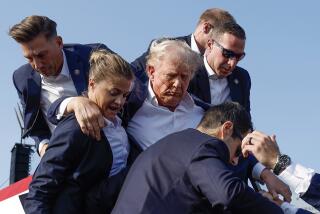Obama calls for new action on gun violence
- Share via
WASHINGTON — President Obama was both consoling and stern Sunday as he called out the names and favorite pastimes of the 12 victims of the Washington Navy Yard shooting before demanding that the U.S. overcome its “frozen” politics to make guns less accessible to those who would commit mass murder.
“Our tears are not enough,” Obama told a memorial attended by about 5,000 people at the Marine Barracks Washington, a few blocks from the Navy Yard in southeast Washington where a gunman killed 12 people last week before he was fatally shot by police.
“Our words and our prayers are not enough. If we really want to honor these 12 men and women, if we really want to be a country where we can go to work, and go to school, and walk our streets free from senseless violence, without so many lives being stolen by a bullet from a gun, then we’re going to have to change. We’re going to have to change.”
Obama reminded mourners that in his less than five years as president he had grieved with four other communities struck by mass violence: Ft. Hood, Texas; Tucson; Aurora, Colo.; and Newtown, Conn.
FULL COVERAGE: Navy Yard shooting
After 20 children and six adults were gunned down at Sandy Hook Elementary School in Newtown in December, gun control advocates hoped lawmakers would pass at least limited reforms, including a stricter background check system. But proponents could not overcome the opposition of rural and conservative legislators and the National Rifle Assn.
“I do not accept that we cannot find a common-sense way to preserve our traditions, including our basic 2nd Amendment freedoms and the rights of law-abiding gun owners, while at the same time reducing the gun violence that unleashes so much mayhem on a regular basis,” Obama said Sunday.
The U.S. murder rate is three times that of other developed nations, he said, and the murder rate with guns is 10 times that of other developed nations.
“No other advanced nation endures this kind of violence. None,” he said.
Aaron Alexis, an employee of a Navy contractor, used a rapid-fire shotgun and possibly a guard’s pistol to kill workers at a Navy administrative facility Sept. 16. Despite a history of mental illness and violent tendencies, he was allowed to keep his security clearance and the identification that got him into the Navy Yard. The victims ranged in age from 46 to 73.
“These are not statistics,” Obama said. “They are the lives that have been taken from us.”
Mass shootings “ought to be a shock to all of us as a nation and as a people,” he said. “It ought to obsess us. It ought to lead to some sort of transformation.”
In countries like Britain and Australia, Obama said, a single mass shooting was enough to mobilize and effect change so that mass shootings became rare.
But what sets America apart, he said, “is that we don’t do enough — we don’t take the basic common-sense actions to take guns out of the hands of criminals and dangerous people.”
“By now, though, it should be clear that the change we need will not come from Washington, even when tragedy strikes Washington,” he said.
Before the service, attended primarily by family and friends of the fallen, the president and first lady met with victims’ families.
During the memorial, Obama illustrated families’ losses with vignettes about the victims, including John Johnson, 73.
“John Johnson looked at his wife, Judy, and said what he always said whenever they parted,” Obama said. “‘Goodbye, beautiful, I love you so much.’”
Obama said the U.S. needed to do a better job of securing its military facilities and ensuring that people who needed mental healthcare got it, but those changes were not enough.
“I’ve said before, we cannot stop every act of senseless violence,” he said. “We cannot know every evil that lurks in troubled minds, but if we can prevent even one tragedy like this, save even one life, spare other families what these families are going through, surely we’ve got an obligation to try.”
More to Read
Sign up for Essential California
The most important California stories and recommendations in your inbox every morning.
You may occasionally receive promotional content from the Los Angeles Times.













